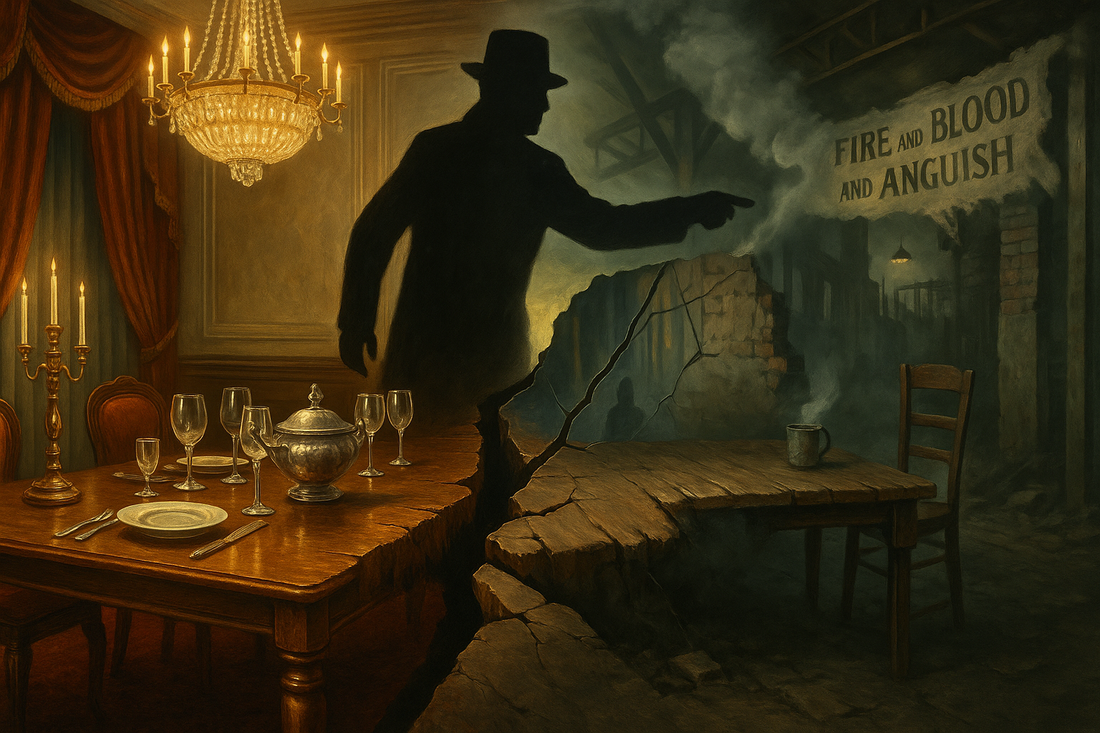
The Class system in An Inspector Calls
Jason PerinbamShare
Confused about how class works in An Inspector Calls? This ultimate page unpacks Priestley’s powerful message about class inequality, how it shapes every character, and why it’s central to getting a top grade in your GCSE exam. For detailed theme analysis, Grade 9 vocabulary, exemplar essays, and 50+ key quotes—check out our full An Inspector Calls Cheat Sheet.
Why Is Class So Central to the Play?
J.B. Priestley wrote An Inspector Calls to challenge the class-based arrogance of early 20th century Britain. Set in 1912—but written in 1945—the play exposes how the upper class exploited and looked down on the working class, often without guilt or consequence.
By showing how every upper-class character contributes to Eva Smith’s downfall, Priestley attacks the social hierarchy and urges change.
Character Breakdown: How Class Affects Each One
Mr Birling – Capitalist & Classist
- Calls Eva a “girl of that class” with disgust
- Fires Eva for asking for a small pay rise
- Believes social status equals worth
▶ Priestley uses Birling to symbolise how the ruling class devalues human life in favour of profit.
Mrs Birling – Elite & Dismissive
- Refuses Eva help because she used the name “Birling”
- Believes working-class girls are naturally immoral
- Cold and patronising: “as if a girl of that sort would ever refuse money”
▶ She embodies the snobbery of the aristocracy and its refusal to empathise with the poor.
Gerald Croft – Upper Class Hypocrite
- Had an affair with Eva/Daisy but defends himself
- “She was young and pretty and warm-hearted”—he sees her as disposable
- Offers temporary help, but with power imbalance
▶ Though he helps Eva, Gerald’s actions still reflect the class-based exploitation of vulnerable women.
Sheila – Wakes Up to Her Privilege
- Initially uses her social power to get Eva fired
- Later accepts guilt: “So I’m really responsible?”
- Challenges her parents’ class-based thinking
▶ Sheila’s character arc represents Priestley’s hope that younger generations can break the class cycle.
Eric – Sees the Injustice
- Took advantage of Eva, but ultimately shows remorse
- “We did her in all right”—accepts collective blame
- Speaks against his parents’ elitism
▶ Eric becomes a symbol of change—recognising that privilege must come with moral responsibility.
Eva Smith – The Voiceless Victim
- Represents the working class: invisible, powerless, and used
- Appears only through other people’s accounts
- Dies as a result of systemic neglect and cruelty
▶ Eva is not just one person—she is symbolic of all working-class individuals failed by society.
Key Quotes on Class + Analysis
“Girls of that class” – Mrs Birling (Act 2)
▶ Sneering tone implies disgust. Priestley criticises her elitist prejudice.
“If you don’t come down sharply on these people, they’d soon be asking for the earth.” – Mr Birling (Act 1)
▶ Reveals fear of working-class empowerment. Shows his obsession with control and superiority.
“There are millions and millions and millions of Eva Smiths and John Smiths still left with us.” – Inspector (Act 3)
▶ Highlights how the class divide is widespread and ongoing.
“Public men, Mr Birling, have responsibilities as well as privileges.” – Inspector (Act 2)
▶ Challenges capitalist entitlement and reminds us that power should serve, not exploit.
Grade 9 Vocabulary for Talking About Class
Use these high-level terms to impress in your essays:
- Stratified – Divided into distinct layers or classes
- Aristocratic – Belonging to or favouring the elite
- Disenfranchised – Deprived of power or rights
- Condescending – Talking down to others; superior tone
- Exploitative – Taking advantage of others for gain
- Classist – Discriminating based on class
Priestley’s Message About Class
Priestley uses An Inspector Calls as a political weapon. He believed the class system created a cold, unequal society where the rich ignored the suffering of the poor. Through the Birlings’ downfall, he warns that:
- Without compassion and social reform, society will repeat its mistakes.
His message?
- Class does not determine morality
- Power must come with responsibility
- We must care for those less privileged than us
Want Full Analysis, Exemplar Paragraphs & More Quotes?
This is just a snippet of our An Inspector Calls Themes Cheat Sheet, which includes:
✅ Deep character profiles (Birling, Sheila, Inspector, and more)
✅ Grade 9 essay examples with examiner annotations
✅ Theme breakdowns + key context to boost your analysis
✅ 50+ premium quotes with advanced analysis
🚀 Upgrade your revision—download the full guide now!
P.S. Struggling with analysis or quotes? Our text-specific cheat sheets break down An Inspector Calls, A Christmas Carol, and more into Grade 9-ready notes.
Why JP Tutors Hub?
Founded by a straight-A student, our resources are:
✨ Exam-board aligned
✨ Used by thousands of GCSE students
✨ Designed to save you time and boost marks
Follow us for more free tips—or visit our shop to upgrade your revision! 🚀